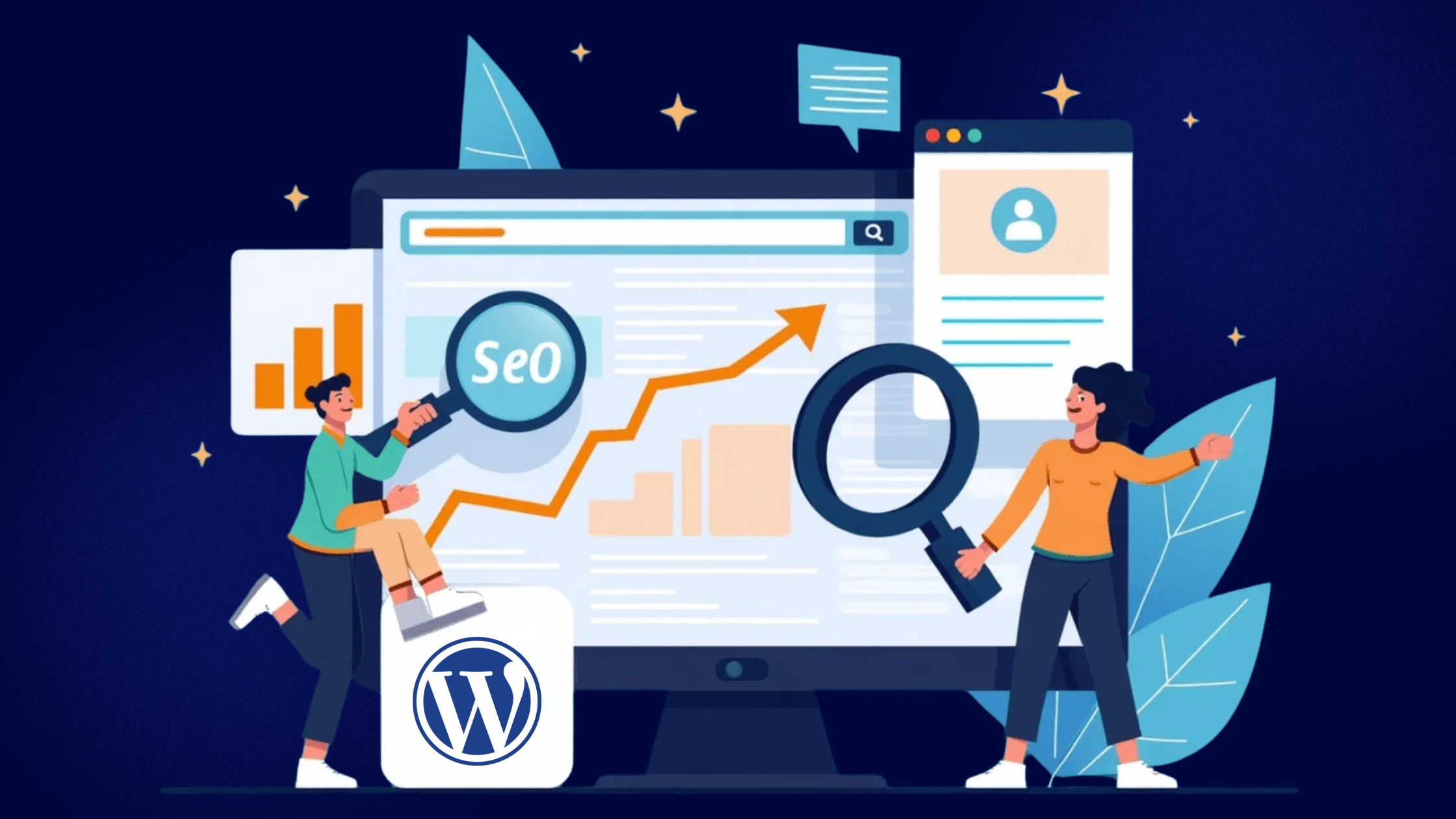Summary
AI-generated content is changing how we write and rank online. But does it harm your WordPress SEO? Not necessarily. When used wisely with human editing, SEO optimization, and fact-checking, AI can actually enhance your content strategy. This blog explores how to balance AI efficiency with human creativity to boost rankings and trust.
Let’s be honest, everyone’s talking about AI-generated content these days. From catchy blog posts to product descriptions, AI is writing everything.
But if you’re running your business website or blog on WordPress, you’ve probably asked yourself a burning question: Will using AI content hurt WordPress SEO?
You’re not alone; this is one of the most common questions marketers, founders, and content creators ask today.
So let’s dive into the story behind this digital confusion and see how AI and WordPress SEO can either be frenemies or best friends depending on how you use them.
The Temptation of AI Content
You’ve got a new WordPress website, sleek design, SEO plugin set up, and a blog section waiting to be filled.
But time is short. Clients are calling. Deadlines are knocking.
So you open your favorite AI writing tool and type. Within seconds, you’ve got a full draft. Grammar perfect. Keywords balanced. Tone on point.
Tempting, right?
But here’s the twist while that content might look great to you, Google’s algorithms are smarter than ever. They don’t just scan words anymore — they understand intent, value, and originality.
And that’s where your WordPress SEO story begins.
What Google Really Thinks About AI Content
Back in 2022, Google openly stated something that made marketers sit up:
AI-generated content that’s meant to manipulate rankings is against our guidelines.”
But fast-forward to 2024, and Google clarified that not all AI content is bad.
Here’s the key point:
It’s not who (or what) writes it, it’s why and how it’s written.
If your AI content is:
- Helpful to users
- Factually accurate
- Adds unique value
- Edited and optimized by a human
Then Google’s fine with it.
But if it’s spammy, keyword-stuffed, or simply rephrased from existing articles, your WordPress SEO will take a nosedive.
The WordPress Advantage When AI Meets SEO Tools
Now, here’s where WordPress becomes your best ally.
Most WordPress users rely on SEO tools like Rank Math, Yoast, or All in One SEO. These plugins are designed to make sure your content AI or not aligns with what Google loves.
Here’s how you can use them smartly with AI-generated content:
- Check readability: Even the best AI can sound robotic. SEO plugins highlight passive voice, sentence length, and tone — all crucial for human-like writing.
- Optimize your focus keyword: Let’s say your blog targets “WordPress SEO.” These tools help place your keyword naturally in the title, meta, slug, and first paragraph.
- Add schema & metadata: Google loves structured data. AI might miss this, but WordPress plugins handle it beautifully.
- Internal linking suggestions: AI might not know your site’s structure WordPress does.
So, when used together, AI + WordPress SEO tools can actually enhance your ranking, not hurt it.
The Hidden Power of Human Touch
Here’s a truth every content marketer eventually learns: AI can write, but it can’t feel.
It doesn’t know your brand story, your voice, or your audience’s emotions.
That’s why blending AI efficiency with human creativity is the real SEO superpower.
Example: AI might write “WordPress SEO is essential for higher rankings.”
But a human would add life to it “Think of WordPress SEO as your digital oxygen. Without it, even the best-looking website struggles to breathe online.”
See the difference?
That emotional connection keeps readers hooked, improves dwell time, and signals to Google that your content offers value.
So no matter how advanced AI gets, it still needs your editing eyes, storytelling sense, and emotional tone to make content rank and resonate.
The Balance Between Speed and Substance
Let’s rewind to our earlier story the busy marketer using AI to fill their WordPress blog.
At first, everything seems perfect. Dozens of posts go live in days. Traffic starts trickling in. But after a few weeks rankings drop. Engagement falls. Bounce rate spikes.
Why?
Because Google realized the content lacked depth, originality, and experience the exact things its E-E-A-T framework (Experience, Expertise, Authoritativeness, Trustworthiness) measures.
The lesson? Use AI for speed, but rely on humans for substance. Think of AI as your content assistant, not your content replacement.
What Successful Brands Are Doing
Let’s peek into what top digital brands do right with AI-generated content on WordPress:
- Hybrid Writing Workflow:
AI drafts the base content → Human edits → SEO plugin optimizes → Manual fact-check before publishing. - Tone Consistency:
Every blog passes through a brand voice filter — AI outputs are rewritten to sound human, authentic, and consistent with brand values. - Continuous Optimization:
They use Rank Math or Yoast to monitor keyword performance, readability, and schema integration regularly. - Content Refresh:
AI tools are great for updating old WordPress blogs, rewriting outdated stats, adding FAQs, and optimizing meta tags.
This mix helps maintain both content velocity (publishing often) and SEO quality (ranking higher).
How AI Can Actually Improve Your WordPress SEO

Surprisingly, when used smartly, AI-generated content can boost your SEO strategy. Here’s how:
- Keyword Research: Tools like ChatGPT or Gemini can suggest keyword clusters that your competitors missed.
- Content Ideas: AI can generate fresh angles for evergreen topics, improving your topical authority.
- Meta Descriptions & Titles: Quick, optimized, and catchy AI helps you save hours.
- Schema Suggestions: With a bit of training, AI can create structured FAQs or How-To schema that Google loves.
- Internal Link Prompts: AI can remind you to link related blogs or service pages, strengthening site structure.
So instead of fearing AI, think of it as a scalability partner for your WordPress SEO strategy.
Common Mistakes to Avoid
Before you go all-in with AI writing, here are some traps to stay clear of:
- Publishing without review: AI can sometimes produce factual errors or hallucinations — always verify.
- Overusing keywords: It might stuff the same keyword too often, which hurts readability and SEO.
- Ignoring originality: Use plagiarism checkers like Copyscape or Grammarly before publishing.
- No author credibility: Add author bios and experience signals to satisfy Google’s E-E-A-T guidelines.
- Lack of human tone: Rewrite robotic lines — add real-life examples, metaphors, or quotes.
The Future of AI and WordPress SEO
We’re entering an era where AI won’t replace writers but writers who use AI smartly will outperform those who don’t.
In the coming years, WordPress SEO will rely more on content quality signals:
- Contextual depth
- Visual storytelling (images, videos, infographics)
- Structured data
- User engagement metrics
AI tools will evolve to assist creators generating outlines, suggesting optimizations, or analyzing ranking gaps.
But at the core, one thing will never change Google rewards content made for people, not for bots.
So, Is AI Content Bad for WordPress SEO?
Let’s settle it once and for all:
No, AI-generated content isn’t bad for WordPress SEO if it’s:
- Human-reviewed
- Factually accurate
- Optimized with tools like Rank Math or Yoast
- Aligned with user intent
- Infused with your brand’s authentic voice
AI gives you the scale. Humans give it soul. Together, they can help your WordPress site climb the SEO ladder faster and smarter than ever.
So next time someone says, “Google will penalize you for using AI content, ”smile and tell them, “Not if you know how to make it work with you, not against you.”
Because the real secret isn’t in choosing between AI or human. It’s in blending both beautifully to create content that informs, inspires, and ranks.







